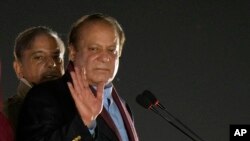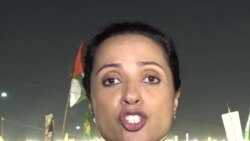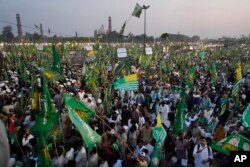Pakistan's former three-time Prime Minister Nawaz Sharif returned home Saturday after four years in self-imposed exile, months before a general election.
The 73-year-old politician landed at Islamabad airport from Dubai on his chartered plane, where he signed and filed appeals through his attorneys against his convictions for corruption. Sharif later flew to his native Lahore to address a homecoming rally organized by his Pakistan Muslim League-Nawaz party, or PML-N, in the eastern city.
A Pakistani court allowed Sharif to travel to London for medical treatment in 2019 while he was serving a seven-year sentence for corruption on the condition that he would return within four weeks to complete his prison term. He defied that agreement and was declared a fugitive.
VOA's Sarah Zaman reports from Lahore:
The former prime minister denied corruption charges, claiming the powerful Pakistani military orchestrated them to facilitate his ouster from power in 2017 and disqualify him from holding public office.
Sharif arrived back in Pakistan after a federal court granted him protective bail in a rare ruling Thursday, barring authorities from arresting him until he appeared before the court Tuesday.
It is widely perceived, and his party members privately have acknowledged, that Sharif's return was the outcome of a deal with the military.
Pakistan has been in political and economic turmoil since the former cricket star turned prime minister, Imran Khan, was ousted from power in April 2022 through a parliamentary no-confidence motion.
The country has witnessed frequent protests over Khan's removal, record levels of inflation and rising energy prices blamed on his immediate successor, former Prime Minister Shehbaz Sharif, the younger brother of Nawaz Sharif.
While speaking to reporters at Dubai airport, Nawaz Sharif said the situation in Pakistan was “alarming and worrying,” claiming his party was “competent enough to solve the country's problems.”
The former prime minister, while addressing the Lahore rally, blamed his ouster for financial challenges facing Pakistan, claiming the country was economically progressing under his leadership.
“Is this why you ousted me?” Sharif asked, without naming the military. He cannot run for or hold public office because of his convictions, but his legal team and party leaders say Sharif plans to appeal so he can contest national elections expected in late January and perhaps become prime minister for a fourth time.
Khan, 70, is now behind bars on controversial corruption charges and faces dozens of lawsuits he alleges the military has fabricated to keep him from staging a comeback to power. He also rejected his ouster as illegal, saying it was orchestrated by the army at the behest of the United States for his neutrality over the Ukraine war.
Washington and the Pakistani army denied the charges.
Khan’s Pakistan Tehreek-e-Insaf party, or PTI, decried Sharif’s homecoming, saying the “coward fugitive” returned under a “judicial asylum.” Without naming the military, a PTI spokesperson said that the “state has buried shame, modesty, law and justice with its own hands” to pave the way for a “national criminal" to return to Pakistan.
The military has staged repeated coups against elected prime ministers since Pakistan gained independence from Britain in 1947 and ruled the country for over three decades. Analysts and former Pakistani leaders say the army significantly influences policymaking even when it is not in power.
The last coup was led by then-army chief Gen. Pervez Musharraf in 1999, ousting Sharif during his second stint in office and leading to a decade of dictatorial rule in the nuclear-armed nation of about 241 million people.
Musharraf arrested Sharif, and a special court later convicted him and sentenced the deposed prime minister to prison on controversial terrorism charges.
Sharif later was allowed to go into exile with his family in Saudi Arabia at the intervention of the Saudi leadership. He returned to Pakistan in 2007 and became the prime minister in 2013 for a record third time after his party won elections.
Khan, a bitter rival of Sharif, remains the most popular national political leader, and his PTI is rated as the country's largest political party, according to all recent public surveys.
"So far Nawaz's return has gone exactly as PML-N planned; A smooth arrival and massive crowds the party worked very hard to attract," said Michael Kugelman, director of the South Asia Institute at the Willson Center in Washington. "But it gets more difficult from here. He'll have to address internal party fissures, his legal woes, the bad economy, a vote bank impacted by Khan," Kugelman wrote on X, formerly known as Twitter.









